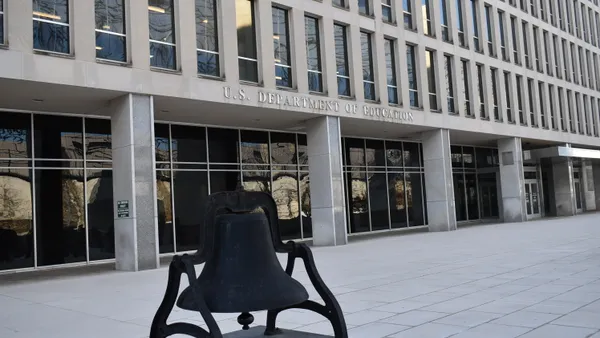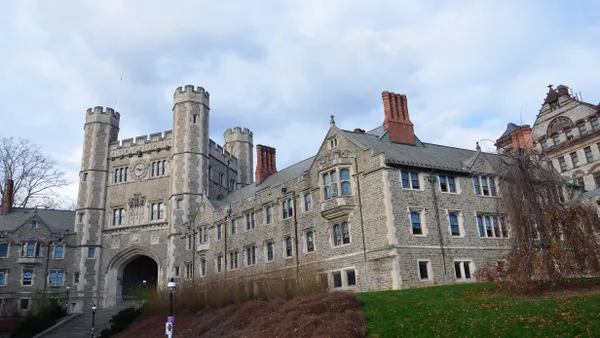UPDATE: Feb. 2, 2021: Grand Canyon University is taking the U.S. Department of Education to court in an effort to require the federal agency to classify it as a nonprofit institution for the purpose of receiving federal financial aid. In a filing Tuesday in the U.S. District Court for the District of Arizona, the university argued that the department's decision to regard it as a for-profit is "arbitrary and capricious" and lacking "fundamental fairness."
Among its complaints, Grand Canyon contends the department exceeded its authority by "questioning" aspects of the school's new relationship with its former parent company, which is now its education services provider. The university also challenged the basis of the department's ability to determine whether an institution is a nonprofit or a for-profit.
The university announced last month that it planned to sue the department, its latest move in a years-long battle to revert to nonprofit status with the department.
Dive Brief:
- Grand Canyon University says it will sue the U.S. Department of Education over the agency's 2019 decision to reject the for-profit institution's request to become a nonprofit for the purposes of participation in federal student aid programs.
- The university said in a press release Thursday that it made several changes to address concerns that the department expressed in its 18-page letter in 2019 denying the status change.
- A lawsuit isn't "totally a shock," said Jeff Silber, a BMO Capital Markets analyst who covers the company, citing the department's timing.
Dive Insight:
The university split from Grand Canyon Education in mid-2018, becoming a standalone institution that pays its former parent company to provide a variety of educational services. The publicly traded firm was seeking to shift from being a college operator to an education services provider.
In January 2018, the university sought the department's preliminary assessment of its request to separate from GCE and to be classified as a nonprofit for federal aid participation. Such a review would inform the institution, typically before it moves ahead with the transaction, of any limitations the department would place on its ability to continue accessing federal financial aid. Title IV funding accounted for 72% of the university's revenue in 2020.
The university and GCE closed the deal in July 2018, saying they hadn't received a decision from the agency within the expected timeframe.
The department didn't issue its formal decision until November 2019, at which point it denied the university nonprofit status, though it accepted the request to separate from GCE. Its comments at the time focused on the new relationship between GCE and the university, calling the latter a "captive client." The department also took issue with the university's president being CEO of GCE.
The university, in its statement Thursday, called the department's decision to not label it a nonprofit "arbitrary and capricious" and said the agency has provided no "valid justification" for doing so. The IRS regards the university as a nonprofit.
GCU cited several steps it took in response to the department’s review. They include getting independent analyses of the university's services payments to GCE and of the overall transaction.
A GCU spokesperson told Higher Ed Dive that the university will likely file the lawsuit in the next two weeks.
The Trump administration's Education Department was widely viewed as supportive of for-profits' attempts to change their status. It issued pre-acquisition reviews for two other high-profile conversions: Purdue University's purchase of the for-profit Kaplan University, and Zovio's proposed spinoff of the for-profit Ashford University as a nonprofit.
GCU has met resistance, however.
"I think they correctly surmise that there's no way, if they couldn't get a deal done with Trump, that they're going to be able to get one done with Biden," said Trace Urdan, managing director at investment bank and consulting firm Tyton Partners. "Their sort of last best hope at this point is to turn to the courts."















